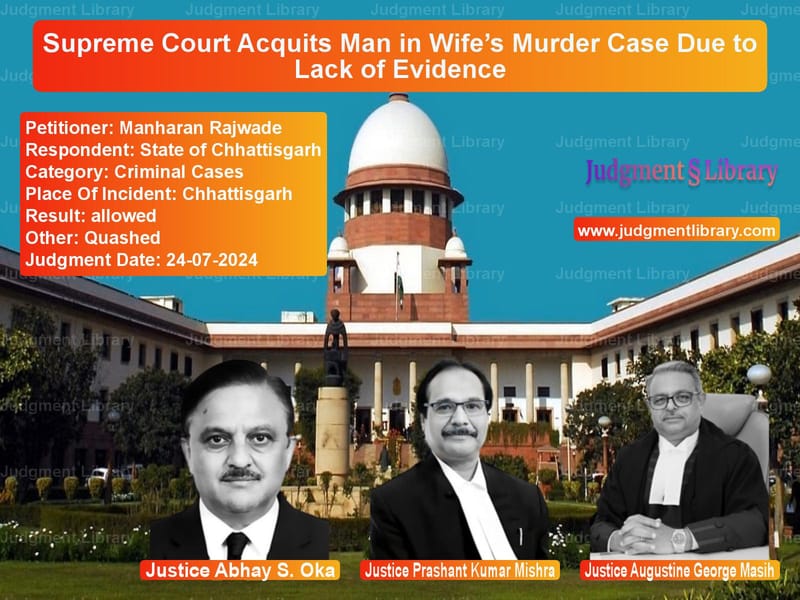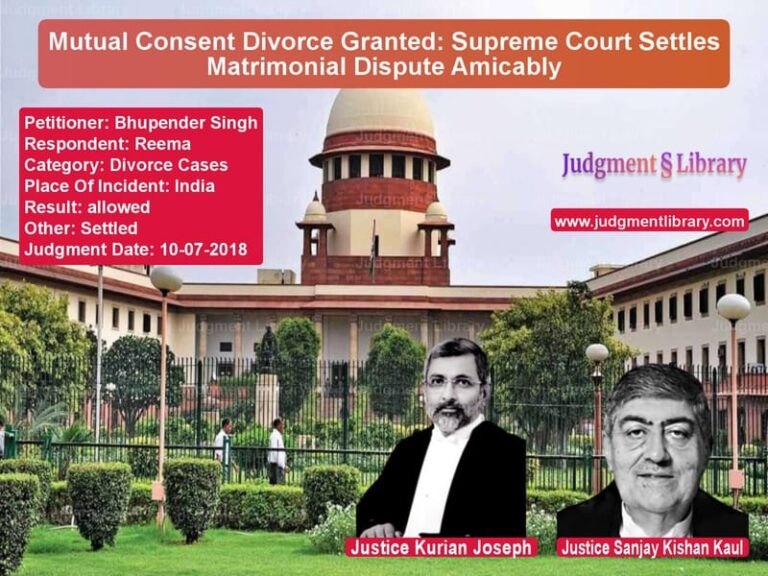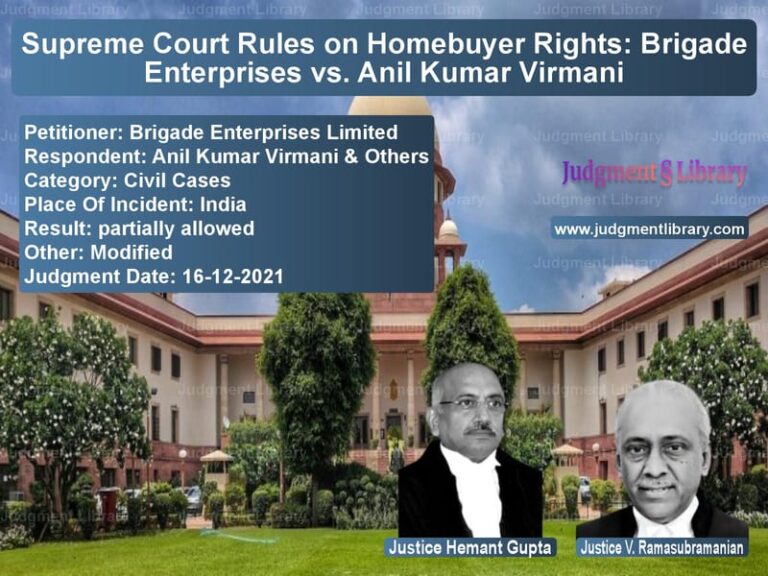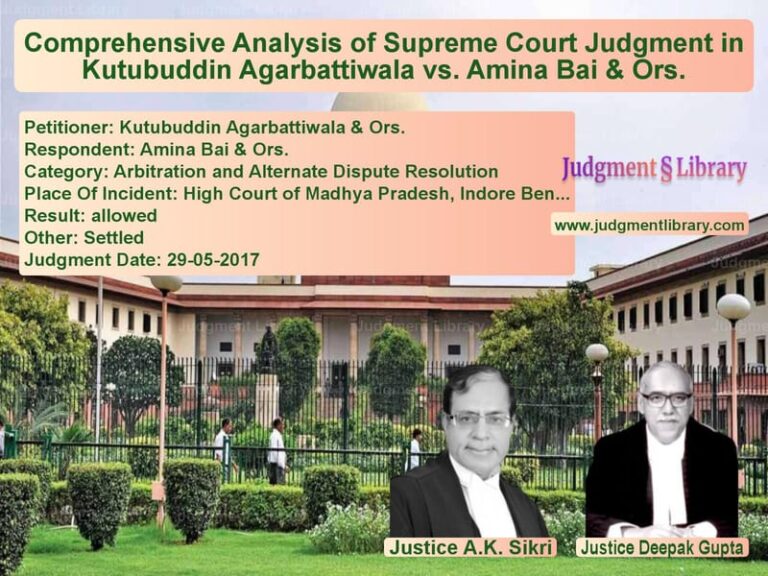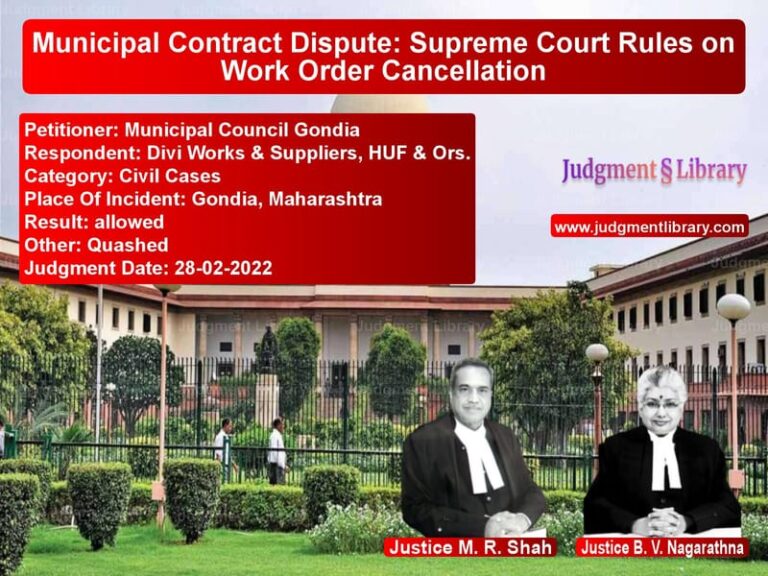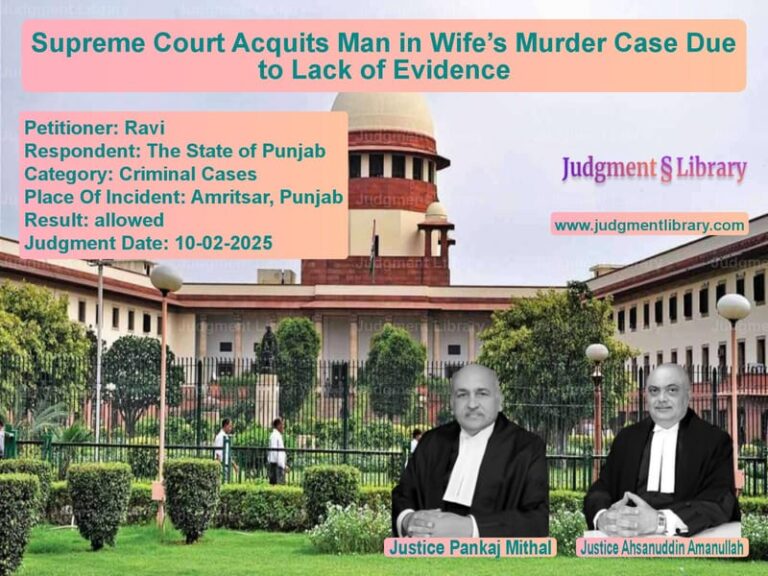Supreme Court Acquits Man in Wife’s Murder Case Due to Lack of Evidence
The Supreme Court of India, in its judgment dated July 25, 2024, acquitted Manharan Rajwade, who was convicted under Section 302 of the Indian Penal Code (IPC) for allegedly murdering his wife, Geeta. The Court ruled that the prosecution failed to establish the accused’s guilt beyond a reasonable doubt, as the case was solely based on the ‘last seen together’ theory without sufficient supporting evidence.
Background of the Case
Manharan Rajwade was convicted and sentenced to life imprisonment for the alleged murder of his wife, Geeta. The prosecution claimed that he strangulated her, and her body was found in their home around 5:00 PM on the day of the incident.
The case relied primarily on circumstantial evidence, particularly the ‘last seen together’ theory. The prosecution alleged that the accused was the last person seen with the deceased and had not satisfactorily explained the circumstances leading to her death.
Prosecution’s Case
The prosecution contended that:
- The accused had a motive to kill his wife, though no concrete proof was presented.
- As per the statements of two key witnesses—Sonawati (PW-1) and Hirmaniabai (PW-2)—the accused was present at the scene around the time of the crime.
- The accused failed to discharge his burden under Section 106 of the Indian Evidence Act, 1872, which requires an accused to explain facts within his special knowledge.
- During his statement under Section 313 of the Code of Criminal Procedure, 1973 (CrPC), the accused admitted to arriving home between 4:00-5:00 PM, thereby establishing his presence at the crime scene.
Defense’s Arguments
The defense, represented by counsel for the appellant, argued that:
- There was no direct evidence linking the accused to the crime.
- The prosecution failed to prove motive, which is essential in a case based on circumstantial evidence.
- The ‘last seen together’ theory was not conclusively proven.
- PW-1 and PW-2 were declared hostile and did not support the prosecution’s case.
- The accused arrived home only after the deceased was already dead, as per the evidence on record.
Supreme Court’s Observations
1. Failure to Establish the ‘Last Seen Together’ Theory
The Supreme Court ruled that the prosecution had not proven that the accused was the last person to be seen with the deceased. The Court noted:
“For invoking Section 106 of the Evidence Act, the prosecution ought to have discharged the burden on it by adducing cogent evidence to prove the appellant’s presence at the relevant time in his house.”
However, the evidence of PW-1 indicated that the deceased had already died before 5:00 PM, while the accused returned home only at 7:00 PM. Thus, there was no basis to shift the burden of proof onto the accused.
2. Lack of Direct Evidence
The Supreme Court emphasized that in cases based on circumstantial evidence, the prosecution must establish a clear and unbroken chain of events leading to the guilt of the accused. The Court held:
“The prosecution has miserably failed to prove the only circumstance it relied upon, namely, that the appellant and the deceased were last seen together.”
3. Weakness of Witness Testimony
Both PW-1 and PW-2 were declared hostile. PW-1 specifically stated that she saw the deceased lying motionless and called a doctor, who declared her dead. The witness further stated that the accused had gone to work and returned home much later.
4. Prosecution’s Failure to Prove Guilt Beyond Reasonable Doubt
The Court reiterated that an accused can only be convicted if the evidence is beyond reasonable doubt. The prosecution failed to provide such evidence in this case.
Final Judgment
- The Supreme Court set aside the conviction and life sentence imposed on Manharan Rajwade.
- The accused was acquitted of the murder charge under Section 302 IPC.
- The appellant was directed to be released immediately, unless required in another case.
Key Takeaways
- Burden of Proof in ‘Last Seen Together’ Cases: The Court emphasized that the prosecution must first establish the accused’s presence at the scene before shifting the burden under Section 106 of the Evidence Act.
- Hostile Witnesses Can Weaken the Prosecution: When key witnesses turn hostile, the case against the accused becomes significantly weaker.
- Absence of Direct Evidence: In circumstantial evidence cases, every link in the chain must be unbroken and clearly point to the accused’s guilt.
- Failure to Prove Motive: When there is no direct evidence, proving motive becomes crucial. The prosecution failed to do so in this case.
Conclusion
The Supreme Court’s ruling highlights the importance of solid and irrefutable evidence in criminal trials. The judgment reaffirms the principle that an accused cannot be convicted merely on suspicion or weak circumstantial evidence. This case serves as a crucial precedent for ensuring fair trials and preventing wrongful convictions.
Petitioner Name: Manharan Rajwade.Respondent Name: State of Chhattisgarh.Judgment By: Justice Abhay S. Oka, Justice Prashant Kumar Mishra, Justice Augustine George Masih.Place Of Incident: Chhattisgarh.Judgment Date: 24-07-2024.
Don’t miss out on the full details! Download the complete judgment in PDF format below and gain valuable insights instantly!
Download Judgment: manharan-rajwade-vs-state-of-chhattisgar-supreme-court-of-india-judgment-dated-24-07-2024.pdf
Directly Download Judgment: Directly download this Judgment
See all petitions in Murder Cases
See all petitions in Bail and Anticipatory Bail
See all petitions in Judgment by Abhay S. Oka
See all petitions in Judgment by Prashant Kumar Mishra
See all petitions in Judgment by Augustine George Masih
See all petitions in allowed
See all petitions in Quashed
See all petitions in supreme court of India judgments July 2024
See all petitions in 2024 judgments
See all posts in Criminal Cases Category
See all allowed petitions in Criminal Cases Category
See all Dismissed petitions in Criminal Cases Category
See all partially allowed petitions in Criminal Cases Category

